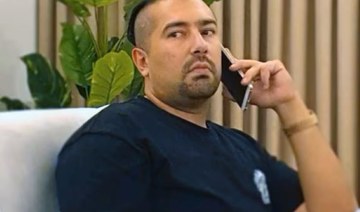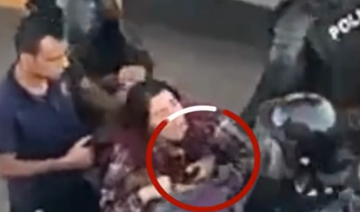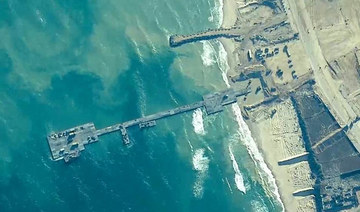SULAIMANIYAH, Iraq: Iraqi Kurd Haresh Talib says he struggles to get paid and his children’s schooling is disrupted in his conflict-riddled country, so he wants to try to flee with his family to Europe — again.
“There is no future here,” says the 36-year-old from the autonomous Kurdistan region in Iraq’s north.
Talib, his hair gelled back and beard neatly trimmed, lives on the first floor of a pastel yellow house with his wife, two sons and a pet bird in a well-kept neighborhood of Sulaimaniyah, Kurdistan’s second-largest city.
Their living room television is showing a British cartoon hit to the great amusement of Talib’s eight-year-old son, Haudin.
Outside, his older brother Hajjant dribbles a football.
HIGHLIGHT
In November, at least 27 migrants, most of them Iraqi Kurds, drowned when they tried to cross the English Channel from France to Britain in an inflatable boat.
“I love Real Madrid. I’m a fan of Benzema,” the 12-year-old says in English, referring to Real’s French star Karim Benzema.
On the surface it might seem the picture of a contented middle-class family, but Talib says they will soon be packing their belongings and hitting the irregular migration trail.
They, and thousands of other Iraqi Kurds, have done it before.
He declines to reveal how he and his family will travel or by what route, but says he wants to reach Britain where he has friends.
“But if that doesn’t work I will go to Germany.”
In November, at least 27 migrants, most of them Iraqi Kurds, drowned when they tried to cross the English Channel from France to Britain in an inflatable boat.
Despite the risks, Talib says he wants to try again — not so much for his own sake, but for his sons, whose schooling is frequently interrupted by teachers’ strikes over unpaid salaries.
“In those countries there is work. You can guarantee that children will get an education,” he says.
Talib holds down two jobs to help his family get by. He’s a printer and a civil servant.
“The government asks us to work but it hasn’t paid us on time for years,” he complains.
While the rest of Iraq struggles to overcome decades of war, Kurdistan has fashioned an image of a stable region suitable for foreign investors.
But its more than 5 million inhabitants see a different reality.
Unemployment there last year exceeded 17 percent, against 14 percent nationwide, according to Baghdad’s Planning Ministry.
Two out of three households in Iraqi Kurdistan rely on a government salary or pension, but payments are chronically late because of tensions between the regional government in Irbil and authorities in Baghdad.
Irbil accuses the central government of not passing along its part of the federal budget for civil servants.
“We’ve seen over the last several years an economic crisis, along with perceptions of widespread corruption and soaring inequality and political stagnation” in Iraqi Kurdistan, said Shivan Fazil, a researcher with the Stockholm International Peace Research Institute.
These have been “among the main drivers of the latest wave of migration” from the area, he said.
At the same time there is “an increasingly repressive pattern of active curtailment of freedom of expression,” through intimidation, arbitrary arrest and other means, a United Nations report said last year.
The threat of conflict, too, is never far away.
In northern Iraq, the Turkish military has been targeting what it says are bases of the Kurdistan Workers Party (PKK), which is listed as a terrorist group by Ankara and its Western allies.
The PKK has been waging an insurgency against the Turkish state since 1984.
Several civilians died in May during strikes by the two sides.
Then there are the local political conflicts between rival clans, the Barzanis of Irbil and the Talabanis of Sulaimaniyah.
Their “struggle for power has nothing to do with the interests of the people,” Talib said, citing unspecified “threats” against him.
Last autumn, thousands of Iraqi Kurds found themselves on the doorstep of the EU, stuck in bitterly cold conditions on the Belarus border.
The West accused Minsk of luring them there in revenge for sanctions against its regime.
Talib and his family were among the crowds after having flown to Minsk by plane.
Between October and December, Talib twice paid a smuggler to help get him and his family into Poland.
In one failed effort, “a dog from the border guards jumped on my son, so I hit the dog. Then the police beat me and we were arrested,” Talib said.
On a third attempt they used false Greek passports. That, too, led to their detention.
They were deported back to Kurdistan in December, weighed down by the same baggage they had left with — an urge to “get out of this jungle.”


























